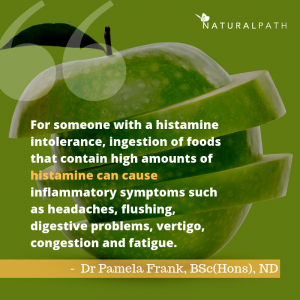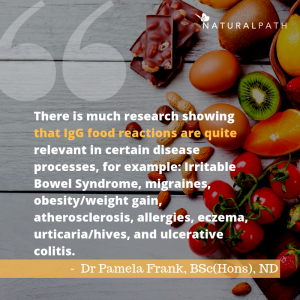Food Allergy Definition
A food allergy is an inappropriate immune system response to a food that can be determined by the production of antibodies to the food. The commonly accepted definition of food allergies, involves more specifically the production of IgE antibodies to foods. These are also called Type I immediate hypersensitivity reactions. These are the most severe food allergies and can cause a life-threatening response known as anaphylaxis. Anaphylactic reactions can cause a person’s throat to close, airways to restrict, hives, wheezing, nausea, vomiting, diarrhea, swelling under the skin, and low blood pressure. Think of the reaction associated with a peanut allergy. Affected individuals are advised to strictly avoid these foods, even in trace amounts and to carry an epinephrine injector with them at all times.
Celiac disease, which is a severe gluten allergy, involves IgA and IgG antibodies to gliadin, a protein found in wheat and other cereal grains.
List of the Most Common Food Allergies
The most common triggers of early childhood food allergy are cow’s milk and eggs, which usually cause mild symptoms, limited to the skin (9). Food allergies acquired in infancy usually disappear by early school age.
Other common anaphylactic food allergies are to tree nuts, peanuts, shellfish, soy and wheat.
Food Intolerance Definition
 Food intolerances are foods that a person may have difficulty digesting that result in symptoms such as gas, bloating, abdominal pain and diarrhea. In this instance a person may lack the appropriate enzymes to digest the food, such is the case in lactose intolerance. An enzyme called lactase is required to break down lactose. The enzyme is located on the surface of the gut lining. It is detectable from 8 weeks gestation. Lactase enzyme activity increases until week 34 of pregnancy and lactase expression is at its peak by birth. The ability to digest lactose during the period of breast-feeding is essential to the health of the infant. However, lactase activity starts to decrease shortly after birth. In most humans, this activity declines following weaning to undetectable levels. The exceptions to this rule are the descendants of populations that traditionally domesticated cows. In these people, the enzyme persists into adulthood. Lactase enzyme persistence is highest in those of Northern European descent, moderate in those of Mediterranean and Middle Eastern descent and lowest in those of Asian and African descent (37). Lack of this enzyme means that foods containing lactose (dairy products), end up poorly digested in the intestines, where bacteria can ferment the lactose creating bloating, gas, gurgling and abdominal pain. Undigested lactose also causes diarrhea because the unabsorbed lactose leads to more water being retained in the stool, causing something known as osmotic diarrhea.
Food intolerances are foods that a person may have difficulty digesting that result in symptoms such as gas, bloating, abdominal pain and diarrhea. In this instance a person may lack the appropriate enzymes to digest the food, such is the case in lactose intolerance. An enzyme called lactase is required to break down lactose. The enzyme is located on the surface of the gut lining. It is detectable from 8 weeks gestation. Lactase enzyme activity increases until week 34 of pregnancy and lactase expression is at its peak by birth. The ability to digest lactose during the period of breast-feeding is essential to the health of the infant. However, lactase activity starts to decrease shortly after birth. In most humans, this activity declines following weaning to undetectable levels. The exceptions to this rule are the descendants of populations that traditionally domesticated cows. In these people, the enzyme persists into adulthood. Lactase enzyme persistence is highest in those of Northern European descent, moderate in those of Mediterranean and Middle Eastern descent and lowest in those of Asian and African descent (37). Lack of this enzyme means that foods containing lactose (dairy products), end up poorly digested in the intestines, where bacteria can ferment the lactose creating bloating, gas, gurgling and abdominal pain. Undigested lactose also causes diarrhea because the unabsorbed lactose leads to more water being retained in the stool, causing something known as osmotic diarrhea.
List of the Most Common Food Intolerances
Lactose: a sugar found in milk and dairy products
Fructose: a sugar found in fruit
Histamine intolerance: histamine is a chemical compound produced in your body, but is also present in foods, particularly stored or preserved foods. Some people lack an enzyme known as DAO to effectively break down ingested histamine, leading to dietary histamine intolerance. For someone with a histamine intolerance, ingestion of foods that contain high amounts of histamine can cause inflammatory symptoms such as headaches, flushing, digestive problems, vertigo, congestion and fatigue.
To add to the mix, there are also foods and food additives that just don’t agree with people and that can trigger headaches or digestion problems, such as MSG, sulfites, lectins, caffeine, nitrites, aspartame and salicylates.
Food Sensitivity Definition
The term food sensitivity is a non-specific term that is often used to describe milder versions of food allergies. These mild food allergies are typically triggered by IgG antibodies to foods and do not cause life-threatening reactions. The release of IgG antibodies to specific foods is considered common, as is the formation of antigen-antibody complexes (which form when a food antigen meets an IgG antibody and they bind together). White blood cells called macrophages typically remove these complexes. However, when many antigen-antibody complexes are present, the capacity of the macrophages to remove them may become overwhelmed. Leftover antigen-antibody complexes can deposit in your tissues and release substances that provoke inflammation. This inflammation is much more prevalent if the reactive food remains a regular part of your diet. Regularly consuming the food perpetuates the production of more immune complexes that may trigger inflammation and contribute to a variety of symptoms. These types of reactions are also called Type III, delayed hypersensitivity reactions (10) as the onset of symptoms may be 6-12 hours after eating the food or even days later.
List of the Most Common Food Sensitivities
The most common food sensitivities exhibited on IgG food sensitivity tests include wheat, gluten, dairy, eggs, almonds, other nuts, pineapple and beans.
Food Sensitivity Symptoms
The symptoms of food sensitivities can include bloating, gas, constipation, diarrhea, abdominal pain, fullness after eating, headaches, migraines, water retention, irritable bowel syndrome, inflammatory bowel disease, and skin conditions like eczema, hives and acne, among other things.
Why Test for IgG Food Sensitivities?
 There is much research showing that IgG food reactions are quite relevant in certain disease processes, for example Irritable Bowel Syndrome (1, 18-25), migraines (2), obesity/weight gain (3), atherosclerosis (3), allergies (4,5), eczema (4), urticaria/hives (5), and ulcerative colitis (6). The common underlying mechanism of all of these conditions is inflammation. Removing IgG food sensitivities can help reduce inflammation and may benefit other inflammatory conditions as well. Medical doctors will check for IgG antibodies to a protein called gliadin when assessing a patient for the most severe form of gluten allergy, known as Celiac disease. One particular subset of IgG antibodies, IgG4, has been shown to help moderate the immune system, improve immune tolerance and reduce inflammation (8). However, this only applies to this specific IgG antibody (IgG4), not to ALL IgG antibodies. Critics of IgG food sensitivity testing need to get their facts straight and not selectively take from research to support their bias.
There is much research showing that IgG food reactions are quite relevant in certain disease processes, for example Irritable Bowel Syndrome (1, 18-25), migraines (2), obesity/weight gain (3), atherosclerosis (3), allergies (4,5), eczema (4), urticaria/hives (5), and ulcerative colitis (6). The common underlying mechanism of all of these conditions is inflammation. Removing IgG food sensitivities can help reduce inflammation and may benefit other inflammatory conditions as well. Medical doctors will check for IgG antibodies to a protein called gliadin when assessing a patient for the most severe form of gluten allergy, known as Celiac disease. One particular subset of IgG antibodies, IgG4, has been shown to help moderate the immune system, improve immune tolerance and reduce inflammation (8). However, this only applies to this specific IgG antibody (IgG4), not to ALL IgG antibodies. Critics of IgG food sensitivity testing need to get their facts straight and not selectively take from research to support their bias.
How Are IgG Antibodies Detected?
The type of food sensitivity test used in reputable laboratories is called ELISA testing, which stands for enzyme-linked immunosorbent assay. It is a scientifically recognized methodology that was developed in 1978. It is widely used in conventional medical and hospital labs around the world. ELISA testing is used to test for HIV, Celiac disease, Hepatitis B and malaria among many other applications in medical laboratories. Other means of checking for food sensitivities have not be scientifically validated. If a lab claims that their unique patented technology (that is not revealed), is somehow superior do be wary. Lymphocyte analysis for food sensitivities has been shown to be less reproducible than ELISA IgG testing.
Those who scoff at IgG food sensitivity testing, have never used it in practice. They have never seen the benefits to people who suffer from rheumatoid arthritis, lupus, asthma, sinus problems, GERD, gallbladder conditions, whole body psoriasis, migraines, irritable bowel syndrome and many other chronic inflammatory conditions.
What About Position Papers that Discourage this Type of Testing?
Does a position paper prove that IgG food sensitivity testing is invalid? Nope. A position paper by definition is only someone’s opinion, again, someone who has never had experience with this type of testing. So in this instance, an opinion based on ignorance.
What is the Difference Between Peanut-Type Anaphylactic Food Allergies and IgG-mediated Food Sensitivities?
Severe and potentially life-threatening food allergies are typically caused by IgE antibodies. Your immune system has 5 antibodies in its arsenal as weapons against infectious organisms like viruses and bacteria. Peanut-Type allergies are usually caused by IgE antibodies. Allergists will test for these using a Skin Prick test. This test exposes the person to food allergens like peanuts by pricking the skin with them and watching for a reaction. This is a useful method for detecting IgE antibodies to foods. IgG-mediated food sensitivities are not identified by the Skin Prick test, as IgG antibodies are found primarily in the blood, lymph and intestine. IgG-mediated food sensitivities do not cause life threatening reactions, but rather “quality of life-threatening” reactions.
If You Eliminate IgG Food Sensitivities, Will You Suffer from Malnutrition? Will it Eliminate Essential Nutrients?
Naturopathic doctors have extensive (4 years after university) training in nutrition. They are well-educated to provide advice on the safe elimination of your food sensitivities. The IgG food sensitivity or food allergy test is used as a means to identify which foods to eliminate as part of an elimination-challenge diet. This process of food elimination and reintroduction helps to identify which foods are particularly problematic and which foods may be just showing up as a result of frequent exposure to them. Naturopathic doctors can provide nutrition counselling and guidance regarding replacement of your food sensitivities with healthier alternatives for you to ensure a well-rounded diet, nutrient-rich diet. If something that you are eating is inflaming your gut, odds are that you are not adequately absorbing the nutrients that this food purports to provide anyway. This inflammation will also adversely affect your ability to absorb anything you eat. So you are more likely to suffer from malnutrition or lack of essential nutrients if you continue to consume these foods, rather than from taking them out.
What About Just Doing an Elimination Challenge Diet?
This is also a viable option that naturopathic doctors offer to our patients. In some instances it works well to identify problematic foods. We can provide guidance about what foods to eliminate, for how long, what to use in place of those foods to ensure good nutrition and how to go about reintroducing foods and what to watch for when you do. In other people, it just doesn’t work because there is no “safe” food that may be exempt from causing a reaction. For example, on food sensitivity testing the following foods have been identified as food triggers in various patients: blueberries, avocado, broccoli, salmon, beef and almonds. In each of these cases, eliminating this offending food has provided relief to the patient of their symptoms. None of these are foods that naturopathic doctors would typically recommend avoiding as part of an elimination diet and in fact most of them are foods that we would encourage people to eat more of. Also, because of the delay in reaction to foods, it may be something that you ate 6-48 hours before that is causing the symptoms you are experiencing right now. This makes it difficult to pinpoint which food you’ve eaten in the last 48 hours that is causing your current symptoms.
What about Electrodermal testing, Cytotoxic testing and Applied Kinesiology food allergy testing?
While some practitioners use these methods and claim excellent results, I do not recommend these means of testing for food allergies or sensitivities. A key requirement for any form of scientific testing is that it has to be reproducible. These methods can provide inconsistent results. Science-based IgG food sensitivity testing should not be confused with these methods.
What Should You Do if You Have Food Allergies?
If you have severe anaphylactic allergies, you should avoid those foods entirely until your allergist finds that you no longer test positive and gives you the okay to consume them.
If you have food sensitivities (or IgG-mediated food allergies), naturopathic doctors can guide you in the process of removing them over the short-term to give your gut time to heal and let inflammation calm down. We can address and remediate the factors that may have lead you to developing food sensitivities in the first place.
If you have many food allergies, it may be that your gut wall is not providing a good barrier between your food and your immune system. Increased intestinal permeability is also referred to in the medical literature as leaky gut syndrome(17). It has been linked to inflammatory bowel diseases like Crohn’s and Ulcerative Colitis (14, 15), but also to mood disorders like Major Depressive Disease(16) and metabolic syndrome (17).
Licensed naturopathic doctors can advise about food sensitivity testing, scientifically proven gut supplementation (11, 12, 13) that help repair your gut and balance your healthy bacteria, along with lifestyle modifications that can also help.
References
- Atkinson W, Sheldon TA, Shaath N, Whorwell PJ. Food elimination based on IgG antibodies in irritable bowel syndrome: a randomised controlled trial. 2004 Oct;53(10):1459-64. Food elimination based on IgG antibodies may be effective in reducing IBS symptoms and is worthy of further biomedical research.
- Alpay K, Ertas M, Orhan EK, Ustay DK, Lieners C, Baykan B. Diet restriction in migraine, based on IgG against foods: a clinical double-blind, randomised, cross-over trial. 2010 Jul;30(7):829-37. doi: 10.1177/0333102410361404. Epub 2010 Mar 10.
- Wilders-Truschnig M1, Mangge H, Lieners C, Gruber H, Mayer C, März W. IgG antibodies against food antigens are correlated with inflammation and intima media thickness in obese juveniles. Exp Clin Endocrinol Diabetes. 2008 Apr;116(4):241-5. Epub 2007 Dec 10. Abnormal immune reactions mediated by IgG antibodies coexisted in patients with IBS. It is of great significance in treating IBS by eliminating the allergic foods according to the serum level of food-specific IgG antibodies.
- Eysink PE, De Jong MH, Bindels PJ, Scharp-Van Der Linden VT, De Groot CJ, Stapel SO, Aalberse RC. Relation between IgG antibodies to foods and IgE antibodies to milk, egg, cat, dog and/or mite in a cross-sectional study. Clin Exp Allergy. 1999 May;29(5):604-10.
- Shakoor Z, AlFaifi A, AlAmro B, AlTawil LN, AlOhaly RY. Prevalence of IgG-mediated food intolerance among patients with allergic symptoms. Ann Saudi Med. 2016 Nov-Dec;36(6):386-390.
- Jian L, Anqi H, Gang L, Litian W, Yanyan X, Mengdi W, Tong L. Food Exclusion Based on IgG Antibodies Alleviates Symptoms in Ulcerative Colitis: A Prospective Study. Inflamm Bowel Dis. 2018 May 16. doi: 10.1093/ibd/izy110.
- Antibodies: Characteristics and Functions of Immunoglobulin’s (Igs) or Antibodies
- van de Veen W, Stanic B, Wirz OF, Jansen K, Globinska A, Akdis M. Role of regulatory B cells in immune tolerance to allergens and beyond. J Allergy Clin Immunol. 2016 Sep;138(3):654-665. doi: 10.1016/j.jaci.2016.07.006.
- Grabenhenrich LB. The epidemiology of food allergy in Europe. BundesgesundheitsblattGesundheitsforschung Gesundheitsschutz. 2016 Jun;59(6):745-54. doi: 10.1007/s00103-016-2358-z.
- Adverse Events Associated with Childhood Vaccines: Evidence Bearing on Causality. Institute of Medicine (US) Vaccine Safety Committee; Stratton KR, Howe CJ, Johnston RB Jr., editors. Washington (DC): National Academies Press (US); 1994.
- Musilova S, Rada V, Vlkova E, Bunesova V. Beneficial effects of human milk oligosaccharides on gut microbiota. Benef Microbes. 2014 Sep;5(3):273-83. doi: 10.3920/BM2013.0080.
- Kim MH, Kim H. The Roles of Glutamine in the Intestine and Its Implication in Intestinal Diseases. Int J Mol Sci. 2017 May 12;18(5). pii: E1051. doi: 10.3390/ijms18051051.
- Davison G, Marchbank T, March DS, Thatcher R, Playford RJ. Zinc carnosine works with bovine colostrum in truncating heavy exercise-induced increase in gut permeability in healthy volunteers. Am J Clin Nutr. 2016 Aug;104(2):526-36. doi: 10.3945/ajcn.116.134403. Epub 2016 Jun 29.
- Michielan A, D’Incà R. Intestinal Permeability in Inflammatory Bowel Disease: Pathogenesis, Clinical Evaluation, and Therapy of Leaky Gut. Mediators Inflamm. 2015;2015:628157. doi: 10.1155/2015/628157. Epub 2015 Oct 25.
- Bischoff SC, Barbara G, Buurman W, Ockhuizen T, Schulzke JD, Serino M, Tilg H, Watson A, Wells JM. Intestinal permeability–a new target for disease prevention and therapy. BMC Gastroenterol. 2014 Nov 18;14:189. doi: 10.1186/s12876-014-0189-7.
- Slyepchenko A, Maes M, Jacka FN, Köhler CA, Barichello T, McIntyre RS, Berk M, Grande I, Foster JA, Vieta E, Carvalho AF. Gut Microbiota, Bacterial Translocation, and Interactions with Diet: Pathophysiological Links between Major Depressive Disorder and Non-Communicable Medical Comorbidities. Psychother Psychosom. 2017;86(1):31-46. Epub 2016 Nov 25.
- Fändriks L. Roles of the gut in the metabolic syndrome: an overview. J Intern Med. 2017 Apr;281(4):319-336. doi: 10.1111/joim.12584. Epub 2016 Dec 19.
- Atkinson W, Sheldon TA, Shaath N, Whorwell PJ. Food elimination based on IgG antibodies in irritable bowel syndrome: a randomised controlled trial. Gut 2004; 53: 1459–1464
- Zar S, Mincher L, Benson MJ, Kumar D. Food-specific IgG4 antibody-guided exclusion diet improves symptoms and rectal compliance in irritable bowel syndrome. Scand J Gastroenterol 2005; 40: 800–807
- Drisko J, Bischoff B, Hall M, McCallum R. Treating irritable bowel syndrome with a food elimination diet followed by food challenge and probiotics. J Am Coll Nutr 2006; 25: 514–522
- Zuo XL, Li YQ, Li WJ, et al. Alterations of food antigen-specific serum immunoglobulins G and E antibodies in patients with irritable bowel syndrome and functional dyspepsia. Clin Exp Allergy 2007; 37: 823–830. Serum IgG antibody titres to some common foods increased in IBS and FD patients compared to controls. But there is no significant correlation between symptom severity and elevated serum food antigen-specific IgG antibodies in these patients.
- Yang and Li, Zhonghua Nei Ke Za Zhi. 2007 Aug;46(8):641-3. [The therapeutic effects of eliminating allergic foods according to food-specific IgG antibodies in irritable bowel syndrome].
- Ou-Yang et al 2008. Zhongguo Dang Dai Er Ke Za Zhi. 2008 Feb;10(1):21-4. [Application of food allergens specific IgG antibody detection in chronic diarrhea in children].
- Fergus S, Peter J. IgG-mediated food intolerance in irritable bowel syndrome: a real phenomenon or an epiphenomenom? Am J Gastroenterol 2005; 100: 1558-9.
- Aydinlar EI, et al. IgG-based elimination diet in migraine plus irritable bowel syndrome. Headache 2013;53:514-525. Our findings indicate that food elimination based on IgG antibodies in migraine patients who suffer from concomitant IBS may effectively reduce symptoms from both disorders with possible positive impact on the quality of life of the patients as well as potential savings to the health-care system.
- Agarwal S, Mayer L. Mucosal immunity. In: Food Allergy: Adverse Reactions to Foods and Food Additives. 4th edition. Metcalfe DD, Sampson HA, Simon RA (eds). Blackwell Publishing, Oxford 2008; 19-29.
- Alpay, K., M. Ertas, et al. (2010). “Diet restriction in migraine, based on IgG against foods: a clinical double-blind, randomised, cross-over trial.” Cephalalgia: an international journal of headache 30(7): 829-837. This is the first randomised, cross-over study in migraineurs, showing that diet restriction based on IgG antibodies is an effective strategy in reducing the frequency of migraine attacks.
- Bentz S, Hausmann M, Piberger H, Kellermeier S, Paul S, Held L, Falk W, Obermeier F, Fried M, Schölmerich J, Rogler G, Clinical Relevance of IgG Antibodies against Food Antigens in Crohn’s Disease: A Double-Blind Cross-Over Diet Intervention Study. Digestion 2010;81:252-264. A nutritional intervention based on circulating IgG antibodies against food antigens showed effects with respect to stool frequency. The mechanisms by which IgG antibodies might contribute to disease activity remain to be elucidated.
- Cai C, Shen J, Zhao D, Qiao Y, Xu A, Jin S, et al. (2014) Serological Investigation of Food Specific Immunoglobulin G Antibodies in Patients with Inflammatory Bowel Diseases. PLoS ONE 9(11): e112154. The study demonstrates a high prevalence of serum IgG antibodies to specific food allergens in patients with IBD. sIgG antibodies may potentially indicate disease status in clinical and be utilized to guide diets for patients.
- Dixon, H. S. (2000). “Treatment of delayed food allergy based on specific immunoglobulin G RAST testing.” Otolaryngology–head and neck surgery: official journal of American Academy of Otolaryngology-Head and Neck Surgery 123(1 Pt 1): 48-54.
- Drisko, J., B. Bischoff, et al. (2006). “Treating irritable bowel syndrome with a food elimination diet followed by food challenge and probiotics.” Journal of the American College of Nutrition 25(6): 514-522. These data demonstrate that identifying and appropriately addressing food sensitivity in IBS patients not previously responding to standard therapy results in a sustained clinical response and impacts on overall wellbeing and quality of life in this challenging entity.
- Gell PGH, Coombs RRA, eds. Clinical Aspects of Immunology. 1st ed. Oxford, England: Blackwell; 1963. Section IV, Chapter 1
- Geoffrey Hardman, Gillian Hart, “Dietary advice based on food‐specific IgG results”, Nutrition & Food Science, 2007 Vol. 37 Iss: 1, pp.16 – 23
- Mansueto, Pasquale et al. “Food Allergy in Irritable Bowel Syndrome: The Case of Non-Celiac Wheat Sensitivity.” World Journal of Gastroenterology: WJG 21.23 (2015): 7089–7109. Web. 19 Oct. 2016.
- Mertz, H. R. (2003). “Irritable bowel syndrome.” The New England journal of medicine 349(22): 2136-2146. Ou-Yang, W. X., J. Y. You, et al. (2008). “[Application of food allergens specific IgG antibody detection in chronic diarrhea in children].” Zhongguo dang dai er ke za zhi = Chinese journal of contemporary pediatrics 10(1): 21-24. Food allergy is one of major causes of chronic childhood diarrhea
- Yang, C. M. and Y. Q. Li (2007). “[The therapeutic effects of eliminating allergic foods according to food-specific IgG antibodies in irritable bowel syndrome].” Zhonghua nei ke za zhi [Chinese journal of internal medicine] 46(8): 641-643. Abnormal immune reactions mediated by IgG antibodies coexisted in patients with IBS. It is of great significance in treating IBS by eliminating the allergic foods according to the serum level of food-specific IgG antibodies.
- Yanyong Deng, Benjamin Misselwitz, Ning Dai, and Mark Fox. Lactose Intolerance in Adults: Biological Mechanism and Dietary Management. Nutrients. 2015 Sep; 7(9): 8020–8035.
 Dr. Pamela Frank, BSc(Hons), ND has been in practice as an ND since 1999 and previously worked for 20 years as a medical laboratory technologist. She is Clinic Director of Forces of Nature Wellness in Toronto and was twice voted “Best Naturopath in Toronto.” Pamela maintains a busy, diverse practice with particular expertise in naturopathic treatment of PCOS, PMS, menopause, acne, infertility, uterine fibroids, IBS and endometriosis. Pamela’s interests include fitness, triathlons, yoga, healthy cooking, tennis and karate.
Dr. Pamela Frank, BSc(Hons), ND has been in practice as an ND since 1999 and previously worked for 20 years as a medical laboratory technologist. She is Clinic Director of Forces of Nature Wellness in Toronto and was twice voted “Best Naturopath in Toronto.” Pamela maintains a busy, diverse practice with particular expertise in naturopathic treatment of PCOS, PMS, menopause, acne, infertility, uterine fibroids, IBS and endometriosis. Pamela’s interests include fitness, triathlons, yoga, healthy cooking, tennis and karate.

















